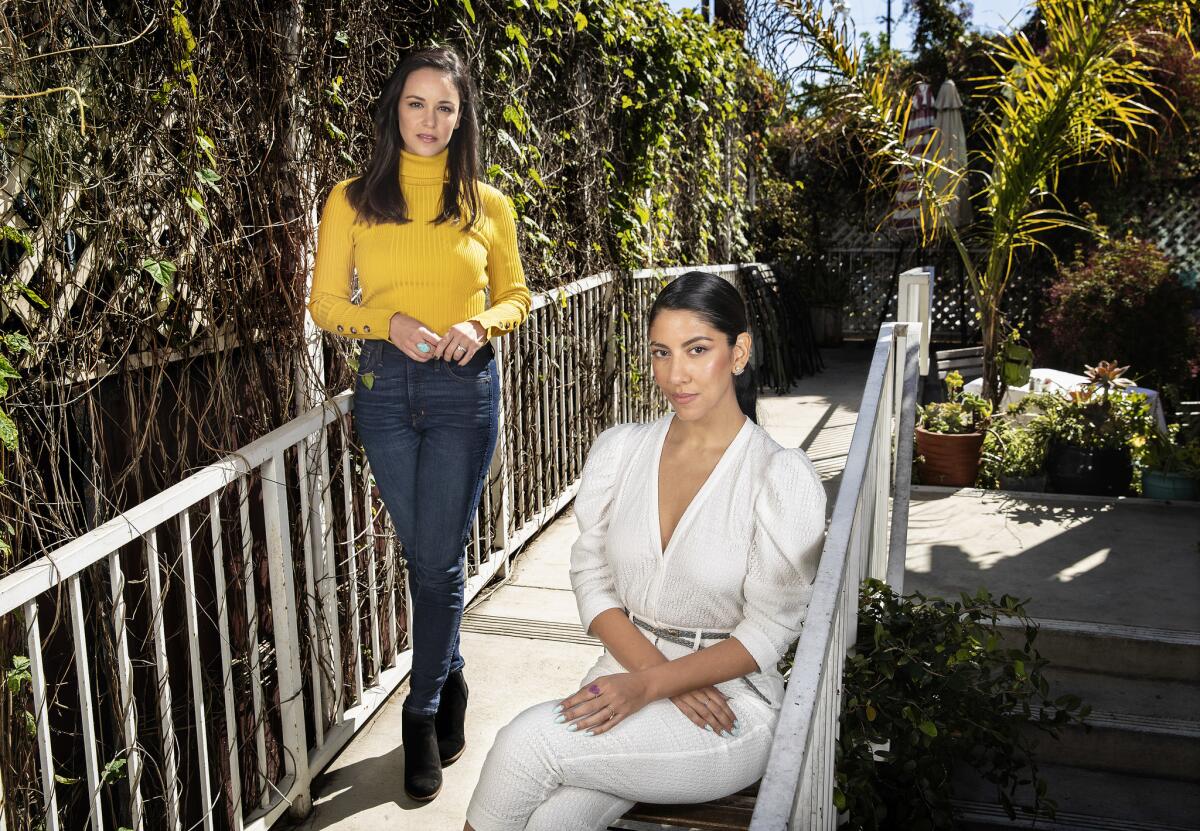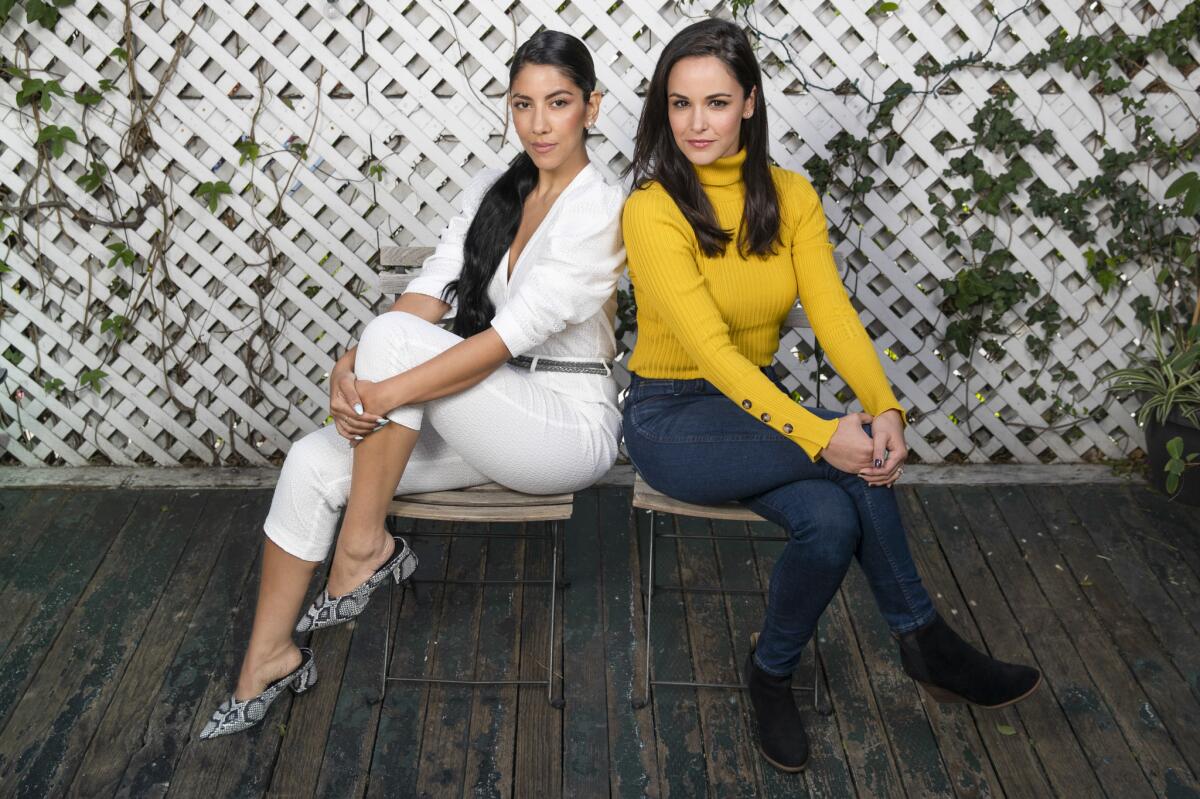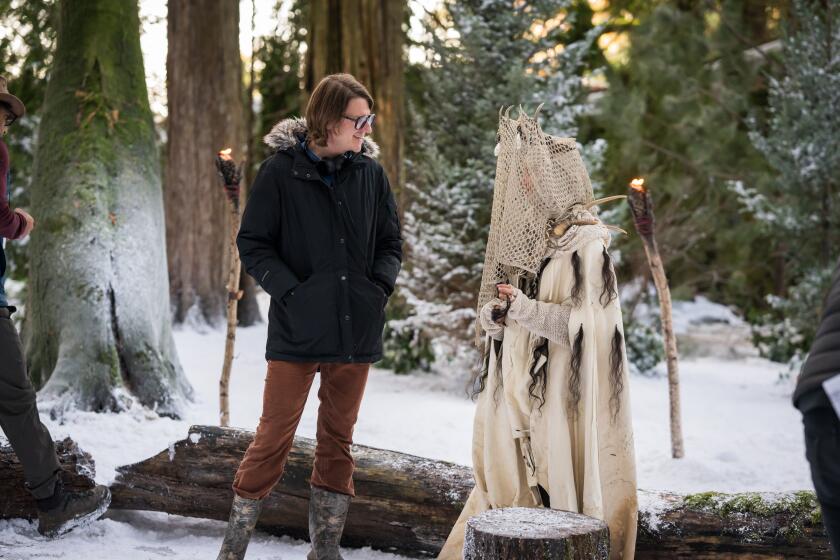‘Brooklyn Nine-Nine’s’ Stephanie Beatriz and Melissa Fumero make their TV directorial debuts

- Share via
Stephanie Beatriz and Melissa Fumero of “Brooklyn Nine-Nine” are sitting alfresco at a Hollywood restaurant on a windy February afternoon uttering phrases pretty common in conversations between women who are seeking new challenges in their work.
“Am I allowed to ask?”
“I don’t want to ruffle any feathers.”
The pair are reflecting on the mental gymnastics of self-doubt that went into making the leap behind the camera this season. After playing Detectives Rosa Diaz (Beatriz) and Amy Santiago (Fumero) for more than 100 episodes, the actresses were ready to tackle new avenues for growth on the job. And with “Brooklyn Nine-Nine,” the series that cheated death and found new life on NBC — the time was now.
Spoiler alert: They did ask and no feathers were ruffled.
MORE: After getting canceled by Fox, ‘Brooklyn Nine-Nine’ gets a second chance on NBC »
The show’s sixth season marks the directorial debuts for both actresses. The episode directed by Beatriz, titled “He Said, She Said” and inspired by the #MeToo movement, airs Thursday. The case at the center of the episode involves a woman who fought off a co-worker’s sexual advances by breaking his, uh, penis. Fumero’s episode, titled “Return of the King,” will air in May and features the return of a familiar face and Diaz coping with an injury.
Beatriz and Fumero join the growing list of actresses who’ve added directing to their repertoire. And their foray carried some added significance for the Latina actresses: the desire to see the numbers change. Women directed 25% of all TV episodes during the 2017-18 season — an increase of 4 points, sure, but far from level with men. And Latinos of both genders directed just 5% of episodic TV shows in the 2017-18 season, according to the most recent report by the Directors Guild of America.
Was directing something you’ve been thinking about for a while?
Beatriz: We’ve done over 100 episodes of this TV show — acting on it. And I think at some point along the way, I realized I was going to do myself a disservice if wasn’t paying really close attention to how it functioned, to what the director’s specific function was. Also, I think our show does a really good job of trying to have different directors come in. But as great as our show [is] at that, the reality is that the numbers are just not there. The amount of men directing comedy, overall, far outweigh the amount of women, and in particular, women of color.
I think it was a no-brainer, absolutely horrifyingly terrifying idea, because I didn’t go to school for this. And so I was like, well … I don’t know … Am I allowed to ask?
Fumero: My manager was sort of the first person to kind of push me, and it was after a job I did that didn’t go so well. I was basically ranting about everything the director did wrong, and he was like, “Do you want to direct?” And I was like, “No, that is not what I’m saying.” But then, I directed a little webisode that he set up just to see if I would like it — something super under the radar, just to test the waters, and I ended up really loving it. And everything Steph said, I totally echo. I think others bringing to my attention the lack of women of color directing, especially in comedy, felt like a responsibility. I also have to give thanks to Steph too, because ... I didn’t ask this season, because it was NBC and ... we’re women, and like, I don’t wanna ruffle any feathers and it was like, I can’t ask a boy to dance, they have to ask me. And then when NBC picked us up for five extra episodes, Stephanie and Joe told me that they put their names in for directing. That kind of gave me the guts to be like, “All right, I’m gonna throw my name in too.” Worse case scenario, they say no.
What’s your reaction to the low number of women and people of color directing TV?
Fumero: Yeah, my mind was blown when [“One Day at a Time’s] Gloria Calderon Kellett told me. She was like, “Do you know I’m the only Cuban woman in the DGA directing half-hour?”
Beatriz: Reader, you can’t see us, but we’re rolling our eyes, back in our heads.
Fumero: It’s crazy.
What preparation did you each do?
Fumero: We had unofficially shadowed [directors] many times before we even threw our names in the goblet of fire. I think that there are rules surrounding shadowing, because it is kind of an invasive thing. You’re going onto a set, usually a set that you don’t work on, and you’re just following around the director all day. So there’s this weird, hovering presence, and you have to get a lot of clearance to do that. We were very lucky in that we were allowed to shadow on the show that we’re on, so everyone knew us and was comfortable with us. Both of us took it upon ourselves to try to do it in other ways and places too on our days off.
Beatriz: “A.P. Bio” was really friendly to us, and let us go onto their set and watch them. I had an opportunity to watch Gloria on an episode of “One Day at a Time,” and that was valuable, because not only is she directing, she’s showrunning, as well. It was just amazing, because it was a different beast because it’s multi-cam. It’s almost like you’re having to edit the episode as you shoot it. It was the first taste, I think, of how exhausted I realized I was going to be during my week of directing. And I thought, “OK, well, I’m not even captain of this ship; I’m like, swabbing the decks over here.” Someone else who really helped me a lot was Claire Scanlon, who’s directed multiple episodes of “Brooklyn Nine-Nine.” Looking at her script was really valuable, because she’s so organized. She gave me so many tips about how to keep my thoughts organized, from the prep week, into shooting, which was really great, because there’s no time to be like, “Aw, I can’t remember what was ...”
Fumero: We also did a day on Matt LeBlanc’s show, “Man With a Plan.” I shadowed Michael McDonald. He’s another director who’s been generous with his time and his advice.

The amount of men that are directing comedy, overall, far outweigh the amount of women, and in particular, women of color.
— Stephanie Beatriz, “Brooklyn Nine-Nine.”
Talk about the importance of mentorship on this journey and the value in embracing different perspectives.
Fumero: Embarking on this for the first time, it was incredibly valuable to have that mentorship. I just go back to the people that are really good and confident in what they do, don’t mind mentoring someone, or bringing someone up, because they don’t see them as a threat. They see it as: It’s just gonna make everything better, it’s gonna make me better, it’s gonna make the stories better, the shows better.
Beatriz: For a long time, there has been a limited amount of seats at the table. Who is going to get those seats? The friends of the people who were in those seats before. And then the friends of those people. Now, we’re adding sections to the table, and we’re bringing in chairs from the back. People are deciding that there’s more stories to be told, there’s more points of view, and subsequently, there’s more people that can share in the telling of those stories. I think we would both, say, owe a huge debt to Dan Goor because he’s in an amazing position, which is, he’s a showrunner, and so he could have said, “They’re not ready.” But, instead, he was like, “Yes, of course. I’m so excited. I’m so excited for your episodes.”
Do you want to direct more?
Beatriz: I want to try to do it again. If we were lucky enough to get another season, I would definitely ask if I could direct another episode. I don’t know enough yet at all. I need to do it again. I need to keep studying it. I need to learn how to do it on a different show. We’re comfortable with our crew and we know our cast, so what is that next big leap of going with someone else’s show and being the new kid in class and taking that on. I feel like it’s an exciting time in our art form right now because there are more seats at the table. What that means is we can take more control about saying to ourselves and to other people, “What do you want to do now? What do you want to do next? What’s the next piece of art that you want to make? How can I help get it made or how can I be a part of that process that’s not just showing up to a lot and going on an audition and waiting to see if you got it or not.”
Fumero: I do. I definitely do, if we’re lucky to have another season. Yeah, I plan to keep doing more shadowing and exploring more other shows and just keep learning, learning, learning. I know I’m not interested in being a filmmaker. For me, I’m just very interested in this half-hour comedy world, just helping people be super funny and make a good show. That to me is exciting. I really love comedians. I have a lot of respect and admiration for them. If I could be of service to that, that’s very exciting to me.
What are your thoughts on directing something you are acting in?
Fumero: Awful, awful. The worst.
Beatriz: I hated it. I hate it.
Fumero: I think I learned a lot for next time about how to make it easier for myself, but ...
Beatriz: I told Melissa to make sure she knew all her lines. Because it’s very stressful when you don’t.
You both talked about your initial hesitation to ask for the opportunity. What did the experience — the process and eventually the completion — do for you?
Beatriz: Nobody can ever take that away from either one of us. It’s like we directed a television episode, and now we get to direct another one. Whatever that anxiety was — that disbelief in your abilities or you’re looking around thinking, “Nobody else thinks I can handle this,” or whatever it is — that is a mountain that I overcame that week, which was very, very amazing.
You’ll never not be scared … but do it anyway.
— Melissa Fumero, “Brooklyn Nine-Nine”
I used to have this talk with people all the time in theater, because lots of theater companies will do a show by a black writer or a show by a Latino writer or a show by an Asian writer, and then you’ll hear people complain and say, “I don’t understand why we have to do one of those every season.” When I think about that, I think, wow, you just have never lived in a world in which there’s only one. That’s all you get. That’s not the world that we’re living in anymore. We came to play. We are sitting at the table now. We’re not coming for scraps. We’re here for the … feast.
Fumero: I think back to how many times I was too scared to do something in my 20s, how many times I just didn’t — actually, if we’re being really honest, well into my early 30s. This bravery of “I’m going to try to direct an episode” is very recent. But then you do the thing and you’re like, “Oh, I didn’t need to be as scared as I was,” and how sometimes you just have to jump and go for it, and sometimes that is harder to do if you’re a woman, if you’re a person of color and the sort of mental load that comes with that. It makes me a little sad because I think back and I can think about a lot of things that I was just too scared to do. You’ll never not be scared … but do it anyway.
Twitter: @villarrealy
More to Read
The complete guide to home viewing
Get Screen Gab for everything about the TV shows and streaming movies everyone’s talking about.
You may occasionally receive promotional content from the Los Angeles Times.







